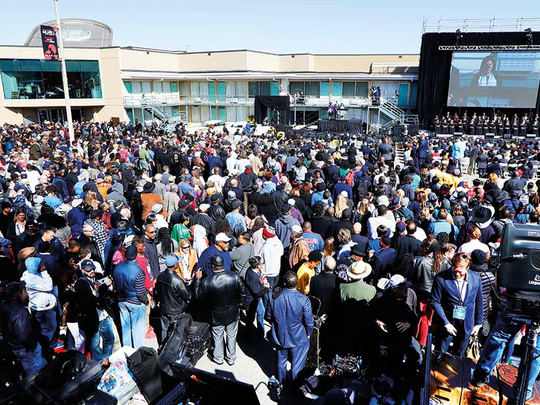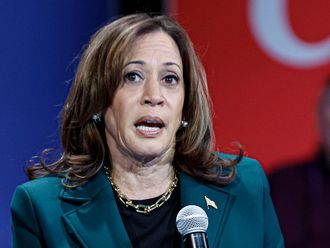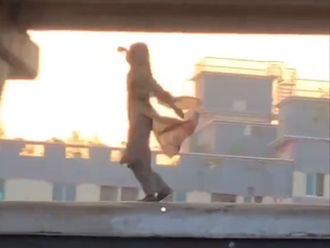
MEMPHIS: Bells rang out Wednesday to mark the moment Martin Luther King Jr was assassinated 50 years ago, as Americans paid tribute to the civil rights leader and reflected on how to carry forward his legacy.
In a country still torn by racial and class divisions, thousands of demonstrators rallied in Memphis, Tennessee where the pastor and Nobel Peace Prize winner was slain aged 39 on a motel balcony by a white supremacist sniper on April 4, 1968.
Bells tolled 39 times at 6:01pm, the moment King was shot, in Memphis and around the nation to honour the icon whose moral courage helped bring lasting changes to American life.
Prominent civil rights activist Reverend Jesse Jackson, a member of King’s entourage, spoke from the Lorraine Motel balcony where King was gunned down and said “the sore is still raw” from the fatal shooting.
Addressing thousands of dignitaries and everyday Americans who gathered for an anniversary ceremony at the motel, which has been transformed into the National Civil Rights Museum, Jackson recalled the “pow!” of the gunshot that slew his movement’s leader.
But he insisted that civil rights freedom fighters “never stopped fighting, we never gave up” on bending American society closer to justice.
“From this balcony,” the 76-year-old Jackson told the crowd, “we decided we would not let one bullet kill a movement.”
Lionised today for his heroic campaigns against racism and segregation, King was a controversial, radical activist who, with a mantra of non-violence, ardently campaigned against poverty and economic injustice, including what he called the continued “exploitation of the poor,” and US wars abroad.
His birthday is a national holiday, and a nine-metre statue in his likeness towers in Washington as a tribute to his life and work.
But despite the reverence for the iconic King, there was broad acknowledgement that his dream has been only partially realised.
“When we look at the state of race relations, we’ve made dramatic progress in 50 years — but we’re nowhere near where we need to be,” King’s activist son, Martin Luther King III, told ABC from Memphis, where he took part in a symbolic march.
“He would know that we as a nation can, must and will do better.”
King catapulted into the national spotlight by taking the lead on a year-long 1950s boycott against racial segregation on local buses.
He is perhaps best known for the “I Have a Dream” speech he delivered to some 250,000 demonstrators on August 28, 1963 as part of the “March on Washington for Jobs and Freedom.”
One year later he became the youngest Nobel Peace Prize winner at 35 for his non-violent resistance.
Before King’s assassination, which triggered an outpouring of grief and riots in more than 100 cities, he had travelled to Memphis to support sanitation workers striking for better conditions and higher pay.
Elmore Nickleberry, now 86, is today one of the last participants in that strike still on the job.
“The mood was mighty bad when he got killed. People started hollering, started crying,” Nickleberry told AFP.
He recalled that poignant moment of tension and pain, but Nickleberry said it is King’s call for non-violent action that lives on.
“That’s what I remember today.”
King’s focus on economic injustice was a rallying point on Wednesday, as union workers marched for fair wages and activists lamented the concentration of poverty within black communities.
King fought not just against the “Jim Crow laws” that discriminated against blacks, said Nancy Taylor, a lawyer attending the march.
“He also fought against economic injustice, and that was the message that’s really been lost in his legacy,” she said.
US President Donald Trump paid homage to the rights leader by proclaiming April 4, 2018 a day to honour King.
“It is not government that will achieve Dr King’s ideals, but rather the people of this great country who will see to it that our nation represents all that is good and true, and embodies unity, peace, and justice,” Trump said in a statement.
Trump has been sharply criticised for divisive comments targeting Latino and Muslim immigrants, and for refusing to condemn outright a violent white supremacist rally last year that ended in bloodshed.
Several US lawmakers travelled to Memphis for the daylong tribute, including Senator Bernie Sanders, who said “the legacy for us is to follow in (King’s) footsteps and to transform this country.”
A large crowd gathered at the motel to hear preachers’ calls for civil and political activism, and were treated to music from legendary soul crooner Al Green.
Thousands marched near a union headquarters where King had joined the sanitation workers on the eve of his assassination.
“I’ve seen the promised land. I may not get there with you,” King prophetically said that evening. “But I want you to know tonight, that we as a people will get to the promised land!”
Barack Obama, the nation’s first black president, paid tribute in a video message, stressing that because of King’s vision, “we found the courage to come as far as we have.”
Speaking in King’s hometown of Atlanta, the Rev. Bernice King recalled her father as a great orator whose message of peaceful protest was still vital decades later.
“We decided to start this day remembering the apostle of non-violence,” she said during a ceremony to award a prize named for her father.
As painful as losing her father was, she said she wouldn’t change history.
“Actually, I’m glad that everything happened the way that it happened because I can’t imagine the world that we live in without the contributions of Martin Luther King Jr. and Coretta Scott King and the sacrifice that they made,” she said.
As a march began in Memphis, people locked arms or held signs as they chanted and sang songs such as “We Shall Overcome.” Memphis police estimated the crowd at about 10,000.
“We know what he worked hard for, we know what he died for, so we just want to keep the dream going,” said Dixie Spencer, who came from nearby Hardeman County, where she’s an NAACP leader. “We just want to make sure that we don’t lose the gains that we have made.”
Martin Luther King III addressed marchers at the end of their route.
“There’s something wrong in our nation where a minimum of 48 million people are living in poverty. That’s unacceptable. We must do better. America should be embarrassed about having people living in poverty,” he said.
In the evening, ringing bells marked the moment King was gunned down at age 39. Members of King’s family pulled a rope together to ring a bell 39 times at the pool surrounding the Atlanta crypt of King and his wife. The family then laid a wreath of multicoloured flowers in front of the crypt. The crowd gathered outside the Lorraine Motel fell silent as the bell began to ring there. A red and white wreath was placed on the balcony where King had been standing when he was shot.
Small-time criminal James Earl Ray pleaded guilty to the killing and quickly recanted, claiming he was set up. The conviction stood, and Ray died in prison in 1998.
Marking the anniversary of the assassination, President Donald Trump issued a proclamation in honour of the slain leader, saying: “In remembrance of his profound and inspirational virtues, we look to do as Dr. King did while this world was privileged enough to still have him.”
The president has been the target of veiled criticism by some speakers at King commemorations in recent days as they complained of fraught race relations and other divisions since he was elected.
Shirley Mason was a young woman living in Detroit when King was killed. Now 70, she said she came to Memphis not only to honour King’s legacy but to call for his work to be continued.
“King went through the struggle and gave up his life,” she said. “Why not get out ourselves and do some sacrificing?”











